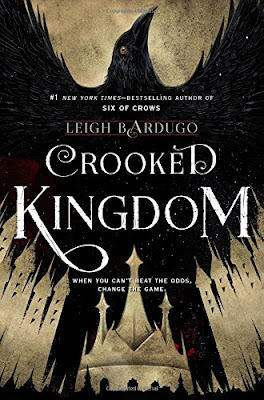If you all didn't know, I'm a big Stiefvater fan. I think she writes such descriptive, lyrical fantasy and unforgettable characters. Two months ago, I was so thrilled to be able to go see Maggie when she came to YALLFest in Charleston, SC.
[This is obviously not a great picture. Sorry! I had to super hurry because she had tons of people in line and a very limited time to sign, so we were all trying to be quick and accommodating so as many of her fans could see her as possible (and I met the nicest two people in line that day, Bonnie and Kirsten!).]
This is Maggie Stiefvater's second standalone novel, after
The Scorpio Races, and is a very odd little book. It has more world-building at the start than most of her books, and is just so niche, and yet positively wonderful. It's rather a redemption story and more magical realism than fantasy. If this is the first book of hers you pick up, you might be caught off guard, especially new teen readers, as it unfolds much more slowly. It contains a lot of characters and presents a number of facts the reader must keep straight to appreciate fully the scope and beauty of the novel. The reader is told of what each character wants and fears, but also of exceedingly strange impossibilities that strain credibility and threaten to make you break the
suspension of disbelief barrier.
However, if you're able to get past this, you'll discover it's actually a gem. No, it doesn't beat my favorite of her novels,
The Scorpio Races, nor is it quite as beloved as the
Raven Boys series. Still, it's a story about a Latin American family, the Sorias, who have a particular set of gifts; they're saints and can perform miracles if they choose. Pilgrims have journeyed from all over to get a miracle out of desperation, and when their darkness is revealed into some manifestation, they must somehow conquer it to be fully healed. However, the sainted Sorias also have fatal flaws: if they interfere with the miracles they grant, their own darkness is revealed and can destroy any number of them. Therefore, the Sorias perform the miracles and then adhere to strict guidelines to stay away from the pilgrims desperate to find their second miracle and be fully healed. The pilgrims meanwhile are growing in number and must live with their particular affliction, like Jennie who can only speak by repeating back what people say to her. What you don't expect is that all the Sorias are pilgrims themselves, even if they don't realize it, and throughout the book, both pilgrims and Sorias have some lessons to learn about letting miracles come to fruition. It exposes a unique truth about being human -- that we all have flaws, big and little; some of us try to improve them, but you can still find the beauty in imperfections and courage in the effort of conquering them.
As far as the representation of Latinx culture, I can't really speak with any authority on that, but it didn't feel offensive to me. It felt rather like it brought out some truths that could be out there and happen to apply to this family. I enjoyed that this had a different perspective of culture and setting. [I think we're all pretty tired of reading only about white people, and honestly, writing about only yourself (which you can't change) is boring and unimaginative and kind of selfish. How much better to write about different people and bring them to life in a unique way?] I loved having such a close range of family. I felt that was true to culture and the way I've seen it represented in people I know. Especially enjoyed that there is such a close sibling-like relationship between the cousins.
I wish we got to see more of Pete and the inside of Joaquin are the only two complaints I can give. I loved the bits with the rooster, also Francisco's roses, and I'm reminded how I'm always struck by the animals in Stiefvater's novels. I don't think she'll ever write a book without a significant animal.
The imagery is particularly memorable (see quotes below) and Marisita's tale of her past still comes to life vividly. Two other things I enjoyed were that 1) the owls, who seemed to congregate around the miracles, seemed rather like winged hope and that 2) Beatriz, who is descibed as la chica sin sentimientos or "the girl without feelings," who really discovered she had feelings but perhaps didn't know how to express them. Contrast her with Marisita who literally wore her feelings as falling sorrows of rain, and that just really makes me happy to have both of them. Can you tell they were my favorite?
Interesting quotes or other excerpts:
The beginning of Pete and the desert...
[Tony speaking] "You always this pedantic? Why don't you turn on the radio?"
There was no knob. Pete said, "I can't. The dial's missing."
With satisfaction, Tony replied, "Damn right it is, because I threw it out the window in Ohio. I didn't want to listen to its whining and I don't want to listen to yours, either. Why don't you just point those lost-puppy eyes of yours right out the window and stare at God's country for a while."
. . .
Pete fell deeply in love with it.
This strange cold desert does not care if you live or die in it, but he fell for it anyway. He had not known before then that a place could feel so raw and so close to the surface. His weak heart felt the danger but could not resist.
He fell in love so fiercely that the desert itself noticed.
Owls, Saints, and Witches
Marisita had come from Texas to Bicho Raro, and on the border where she lived, owls were considered with distrust. The problem lay not with the owls themselves but rather with the lechuzas, witches who could transform themselves into owls with human faces. Even though Marisita trusted the intentions of the Sorias, there was no pretending that they didn't have otherworldly abilities. And although she did not believe the Church had been correct to drive them from Abejones, it was not difficult for her to see how she, as one of the Sorias' troubled pilgrims, also did not belong in a church.
It was just that Marisita was not sure that saints and witches were very different in the end.
Just for kicks - There were some horrifying things to note if you are a parent, especially a mom. Here's one example.
George Wyatt was a man of action. George Wyatt had been supposed to die in the womb, as his umbilical cord had been wrapped around his neck, but he'd decided that death was not for him and had chewed himself free. He'd been born two weeks early, his baby hands still clutching the ragged stump of his umbilical cord, his baby mouth already full of teeth.
My favorite quote:
Read an excerpt.
Watch the brief trailer.






























